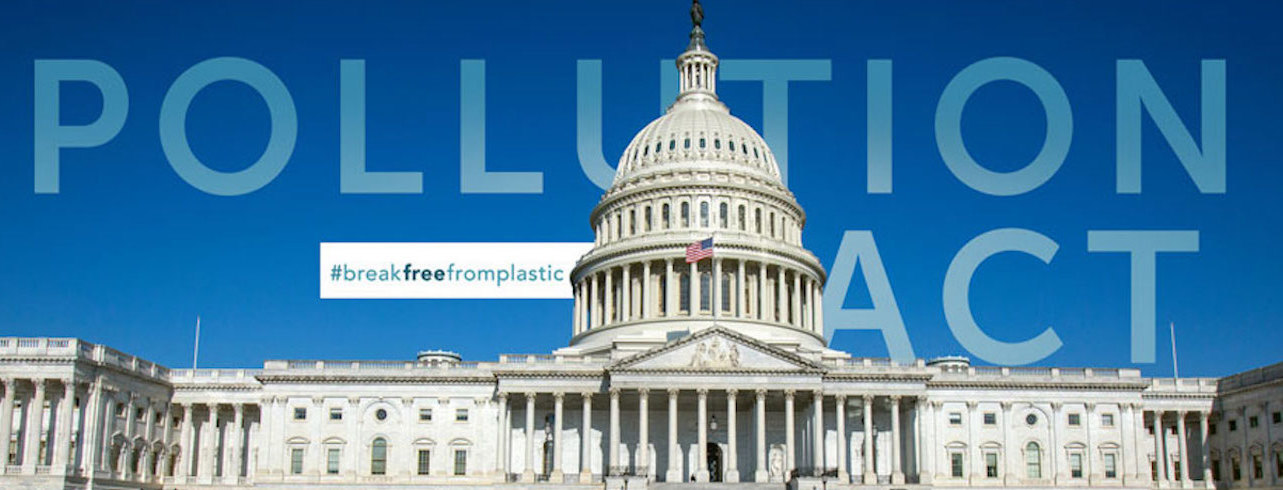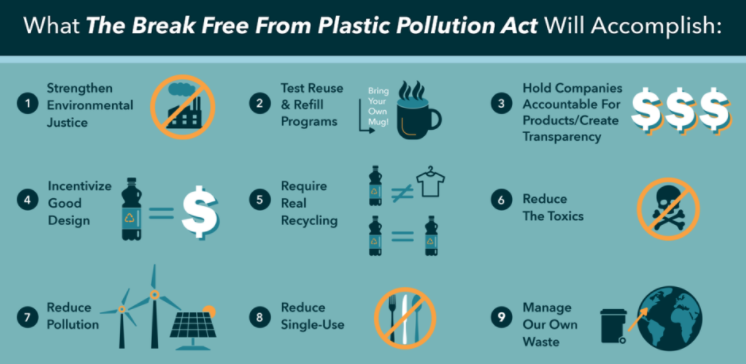
Today, the federal Break Free From Plastic Pollution Act (BFFPPA) was reintroduced (S. 984/ H.R 2238) by Sen. Jeff Merkley (D-OR) and Rep. Alan Lowenthal (D-CA). The Surfrider Foundation has been involved with BFFPPA since its inception and we have been working closely on this reintroduction. The priorities that Surfrider focused on for the reintroduced bill included pushing for incentivizing reuse / refill models, strengthening the definition of reusable bag, addressing toxics more broadly, and closing the loophole for plastic waste exports. We’re happy to report that each of these priorities were addressed in the reintroduced bill.
You can take action in support of the bill by signing our action alert for the Break Free From Plastic Pollution Act.
The reintroduced BFFPPA builds upon momentum from the bill that was introduced last session in February 2020. This session’s bill is off to a strong start with 86 original co-sponsors in the House and 11 original co-sponsors in the Senate, which is even more than the bill garnered at the end of last session. As a sign of the bill’s growing popularity, it was even featured recently on a Last Week Tonight with John Oliver episode about plastic.
What makes the BFFPPA unique is that it addresses plastic pollution across its lifecycle, from extraction and manufacture, to distribution and the point of sale, to disposal and recycling — and it’s based on policies that have been proven effective at local and state levels.
One major theme of the BFFPPA is source reduction of plastic bags, foam foodware, plastic straws, plastic utensils, and plastic produce stickers. Another major part of the bill is Extended Producer Responsibility (EPR), which shifts the cost of recycling, disposal, and cleanup from taxpayers and cities — to the manufacturers of the packaging. This incentivizes manufacturers to make more sustainable packaging and, ideally, shift to reuse and refill systems.
Another big component of the BFFPPA is to strengthen the definition of what can be called “recycling” by clarifying what recycling is and what recycling isn’t. Under the bill, recycling isn’t incineration or plastic-to-fuel. Recycling isn’t shipping low-value plastic waste to developing countries that don’t have the infrastructure to handle it. Allowance for these false solutions are harmful to the environment as well as a humanitarian and environmental justice issue. Also, a lot of exported low-value plastic waste ends up getting dumped into waterways and makes its way to the ocean.
For decades, the plastics industry has spent millions of dollars trying to convince us that recycling is the answer and pushing false solutions. Earlier this week, even before the bill was reintroduced, plastics industry executives held their own press conference in opposition to the BFFPPA. Specifically, they urged Congress not to pass legislation that would hinder development of unproven plastic-to-fuel technology that they call “chemical recycling,” which the BFFPPA requires the Environmental Protection Agency (EPA) to review. The fact that the plastics industry has taken such vocal opposition to the bill at these early stages shows just how far the BFFPPA has come since the last legislative session.
The reintroduced Break Free From Plastic Pollution Act will:
-
Require producers of packaging, containers, and food-service products to design, manage, and finance waste and recycling programs.
Launch a nationwide beverage container refund program to bolster recycling rates.
Ban certain single-use plastic products that are not recyclable.
Ban single-use plastic carryout bags and place a fee on the distribution of the remaining carryout bags, which has proven successful at the state level.
Establish minimum recycled content requirements for beverage containers, packaging, and food-service products.
Channel massive investments in U.S. domestic recycling and composting infrastructure.
Prohibit plastic waste from being shipped to developing countries.
Protect state and local governments that enact more stringent standards.
Require EPA to partner with the National Academies of Science to conduct a comprehensive study on the environment and cumulative public health impacts of incinerators and plastic chemical recycling facilities.
Establish a temporary pause on permitting new and expanded plastic production facilities while the EPA creates and, as necessary, updates regulations on plastic production facilities to protect frontline and fenceline communities from direct and cumulative impacts on public health.
Updates for reintroduction include:
-
Closes waste export loopholes by banning waste exports to countries who themselves re-export to developing countries.
Includes additional language to ensure minimum standards for what bags can be considered “reusable.”
Includes important language justice requirements to ensure that professional translation services are provided for non-English speaking communities and accessibility services for the disability community.
Expands the definition of toxic chemicals and prohibits such toxic chemicals from being included in covered products.
Includes actions to limit microfiber pollution by mandating filters on washing machines and requires a study on best practices for upstream microfiber pollution prevention.
Incentivizes greater reuse through the creation of pilot programs to implement reuse and refill technology.
Expands previous language tackling plastic pellet pollution, microplastic pollution, and wet wipe labelling standards.
For ongoing updates on the BFFPPA going forward please visit our BFFPPA campaign page.

